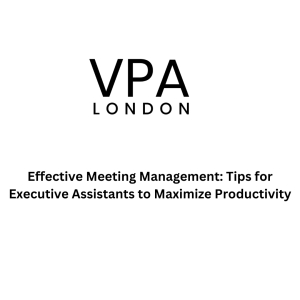As an executive assistant, one of your primary responsibilities is to ensure that meetings run smoothly and efficiently. Effective meeting management is crucial for maximizing productivity and achieving desired outcomes. In this article, we will explore valuable tips and strategies that executive assistants can employ to enhance meeting effectiveness and create a positive impact in their roles.
-
Preparing for the Meeting: Before the meeting takes place, thorough preparation is key to its success. Here are some essential steps to consider:
a. Understand the Meeting Objective: Clarify the purpose and desired outcomes of the meeting. This will help you set an agenda and ensure that the discussion stays focused.
b. Create a Well-Structured Agenda: Develop a clear and concise agenda that outlines the topics to be discussed, time allocations, and any necessary materials or presentations. Share the agenda with participants well in advance to allow for preparation.
c. Coordinate Logistics: Reserve a suitable meeting room or set up a virtual meeting platform. Ensure that the necessary equipment, such as projectors or video conferencing tools, is available and functioning properly.
d. Confirm Attendees and Send Invitations: Identify the key participants and send them formal meeting invitations, including the agenda, date, time, and location. Consider using calendar management tools to simplify the process.
e. Collect and Distribute Preparatory Materials: If there are any pre-read materials or documents required for the meeting, collect and distribute them to participants ahead of time. This enables everyone to come prepared and contribute meaningfully to the discussion.
-
Facilitating the Meeting: During the meeting itself, executive assistants play a crucial role in ensuring that the discussion remains focused, productive, and inclusive. Here are some strategies to consider:
a. Start with a Clear Introduction: Begin the meeting by welcoming participants, restating the meeting objective, and reviewing the agenda. This helps set the tone and expectations for the discussion.
b. Time Management: Keep a close eye on the clock and ensure that each agenda item is allocated the appropriate amount of time. Signal gently if a discussion is taking too long, and tactfully guide the conversation back on track.
c. Encourage Active Participation: Foster a collaborative environment where all participants feel comfortable contributing their ideas and perspectives. Encourage active listening, ask open-ended questions, and facilitate discussions to promote engagement.
d. Manage Disruptions and Conflict: If conflicts or disruptions arise during the meeting, address them promptly and tactfully. Use active listening and conflict resolution techniques to de-escalate tensions and refocus the discussion.
e. Take Comprehensive Meeting Notes: Document key points, decisions, and action items during the meeting. These notes will serve as a valuable reference for participants and ensure accountability for follow-up tasks.
-
Post-Meeting Follow-Up: After the meeting concludes, effective follow-up is essential to ensure that decisions are implemented and actions are taken. Consider the following steps:
a. Distribute Meeting Minutes: Compile the meeting notes and distribute them to all participants in a timely manner. Include action items, responsible individuals, and deadlines to provide clear guidance on next steps.
b. Monitor Action Item Progress: Keep track of the action items and their progress. Follow up with individuals responsible for completing tasks to ensure they are on track and provide support if needed.
c. Solicit Feedback: Consider gathering feedback from meeting participants to identify areas for improvement. This can be done through anonymous surveys or one-on-one conversations to encourage honest input.
d. Evaluate Meeting Effectiveness: Reflect on the meeting's overall effectiveness and identify areas where improvements can be made. Analyze whether the meeting objectives were met and if participants found the discussion valuable.
e. Continuous Improvement: Use feedback and evaluation to continuously refine your meeting management skills. Implement changes and experiment with new approaches to enhance future meetings.
If you are an executive assistant looking for exciting opportunities in London, visit VPA London. They provide comprehensive recruitment services, connecting talented executive assistants with top organizations in the city.
Remember, mastering effective meeting management is a continuous learning process. Embrace the opportunity to refine your skills and adapt to different meeting scenarios. Your efforts will be instrumental in driving successful outcomes and fostering a culture of productivity within your organization.



